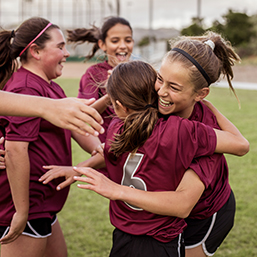-
Written by April Clay, R. Psych.
You may be tempted to shower your child with positive comments about their sports ability, but use caution. Comments and compliments should be sincere and straightforward.
- Children are perceptive and know when compliments are not sincere. Excessive praise for an easily accomplished task may convey negative information about the child’s competence (or you just may get the eye roll if you go on and on). I often hear kids remark, “she has to say I’m great, she’s my mom. But she really doesn’t know anything about soccer, so I don’t listen.”
- Identify beliefs that can lead to stress, worry, and undermine your child’s confidence. Unrealistic expectations placed on your child about scoring, winning, or making someone else happy takes away from the focus of play. If you hear your child make comments like, “I have to score two goals today,” or “I have to win or my coach won’t like me as much,” nip them right away. Help your child develop new thoughts that will help rather than hurt them.
- Go easy on the pep talks. Many parents forget that pumping their child up can tip them over the edge. Keep pep talks short and encouraging, and watch your intensity level. It doesn’t take much for some kids to view these talks as pressure (“If my parents are so intense about this, it must be important. I have to do well.”)
- Be respectful when dealing with an upset child. As adults, we might know that what happened on the field isn’t a big deal, but to your child, it is a big deal and should be approached as such. Try to help your child process events and use open-ended questions. If a tearful child says to you, “I played terribly today,” don’t say, “It will get better tomorrow.” Instead try, “Sounds as though you’re upset. Can you tell me what happened?” This acknowledges the child’s feelings and lets them know you’re willing to help them work it out.
- A child who lives with excessive worry about making mistakes is stressed and unable to enjoy their sport. Create an atmosphere where mistakes are a normal part of learning and playing competitively. Let your child know that it’s okay to miss a shot or take a fall. Tell them that every athlete makes errors and has bad days, and what’s most important is how they handle these challenges. Encourage your child to come up with their very own key word or phrase they can repeat to themselves when something goes wrong to help them get back on track. Have fun coming up with a cue and then encourage your child to try it out next time in practice.
April Clay, R. Psych., is a Calgary-based psychologist specializing in sport psychology and injury rehabilitation. For more information, visit bodymindmotion.com. To book an appointment, email april@bodymindmotion or call 403-283-5525.
See our related articles:
